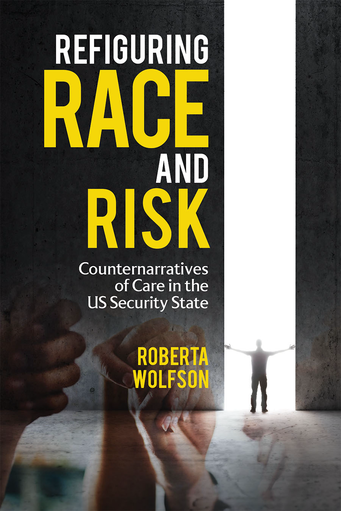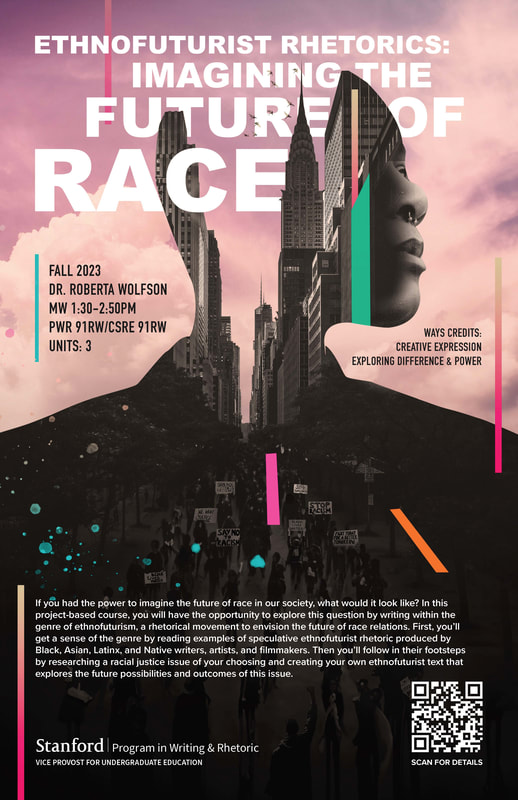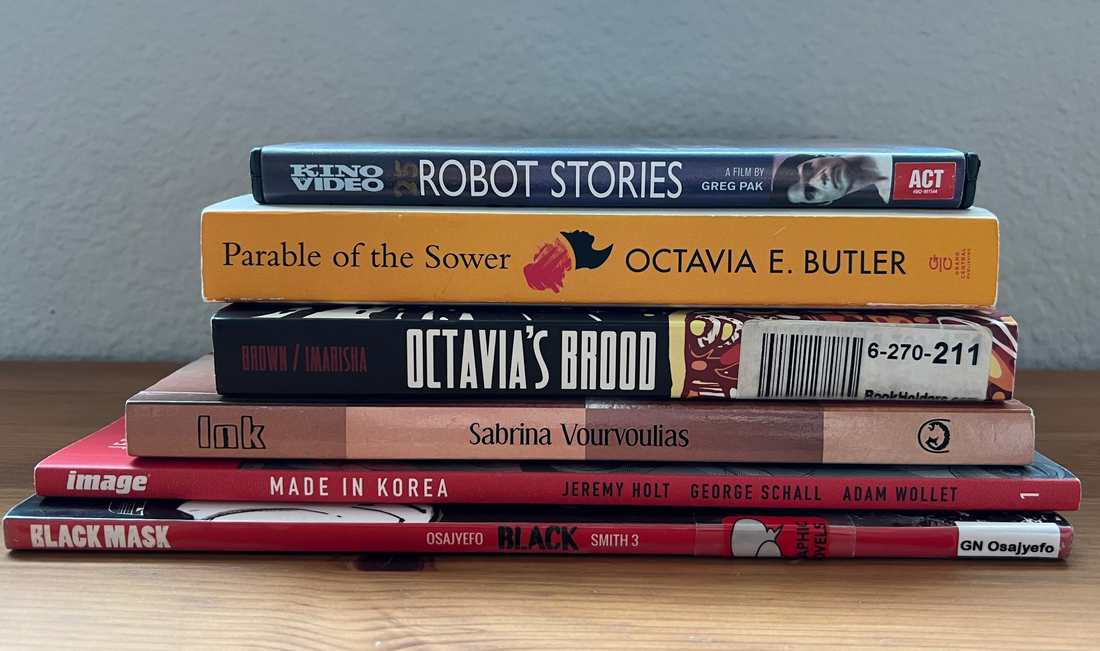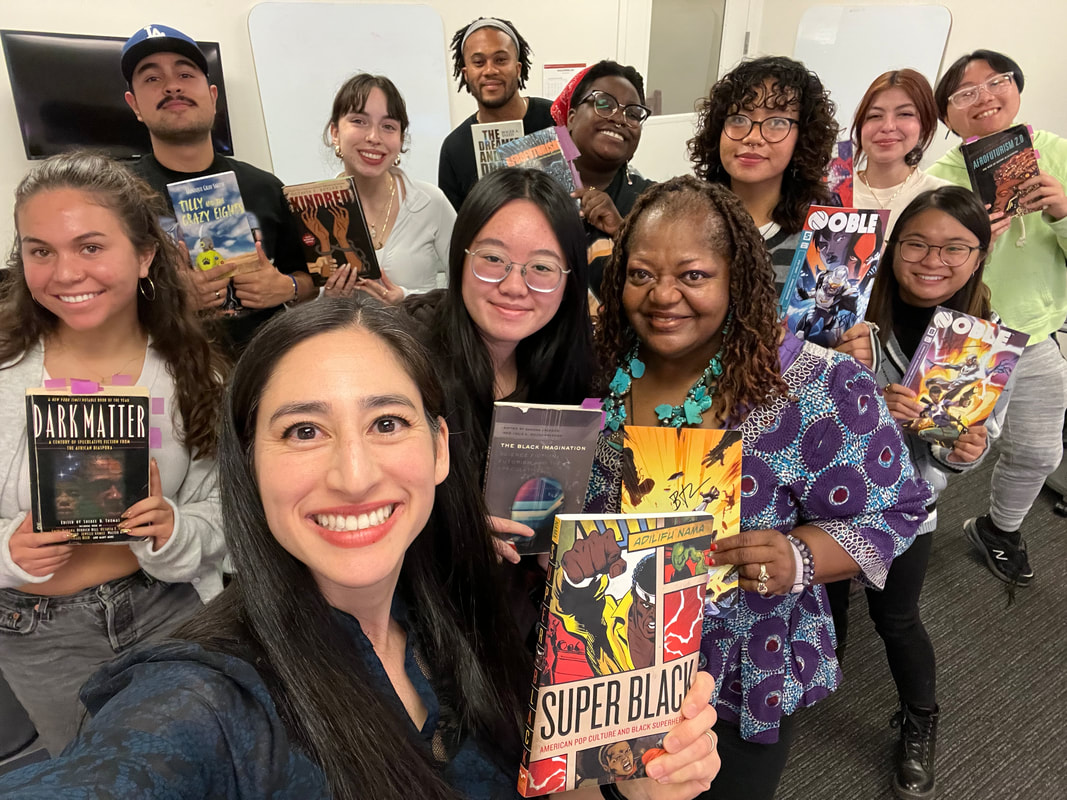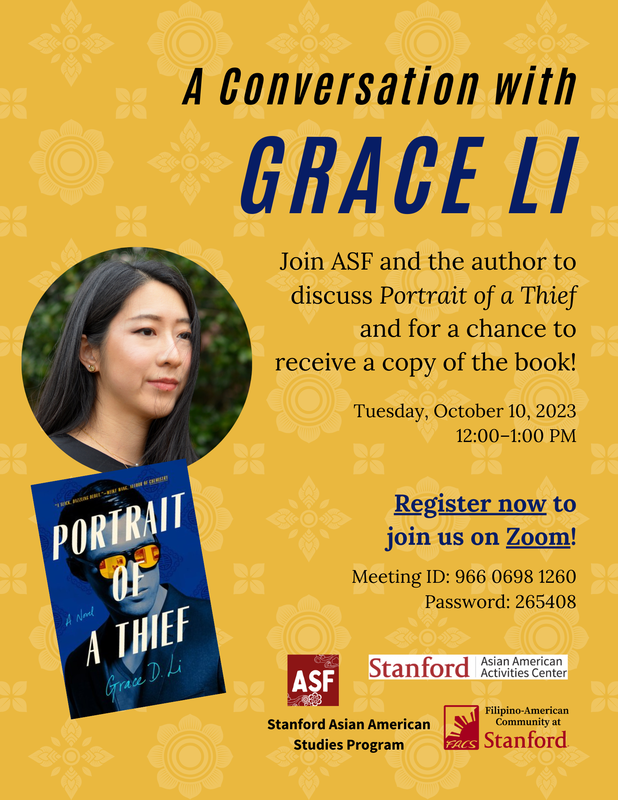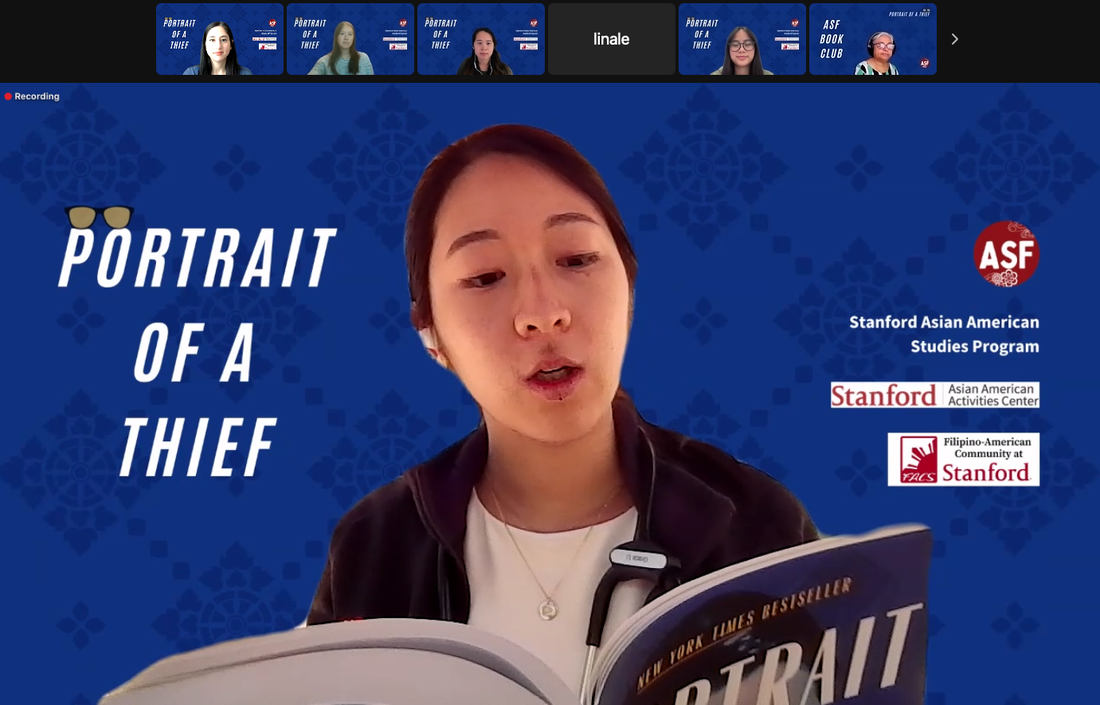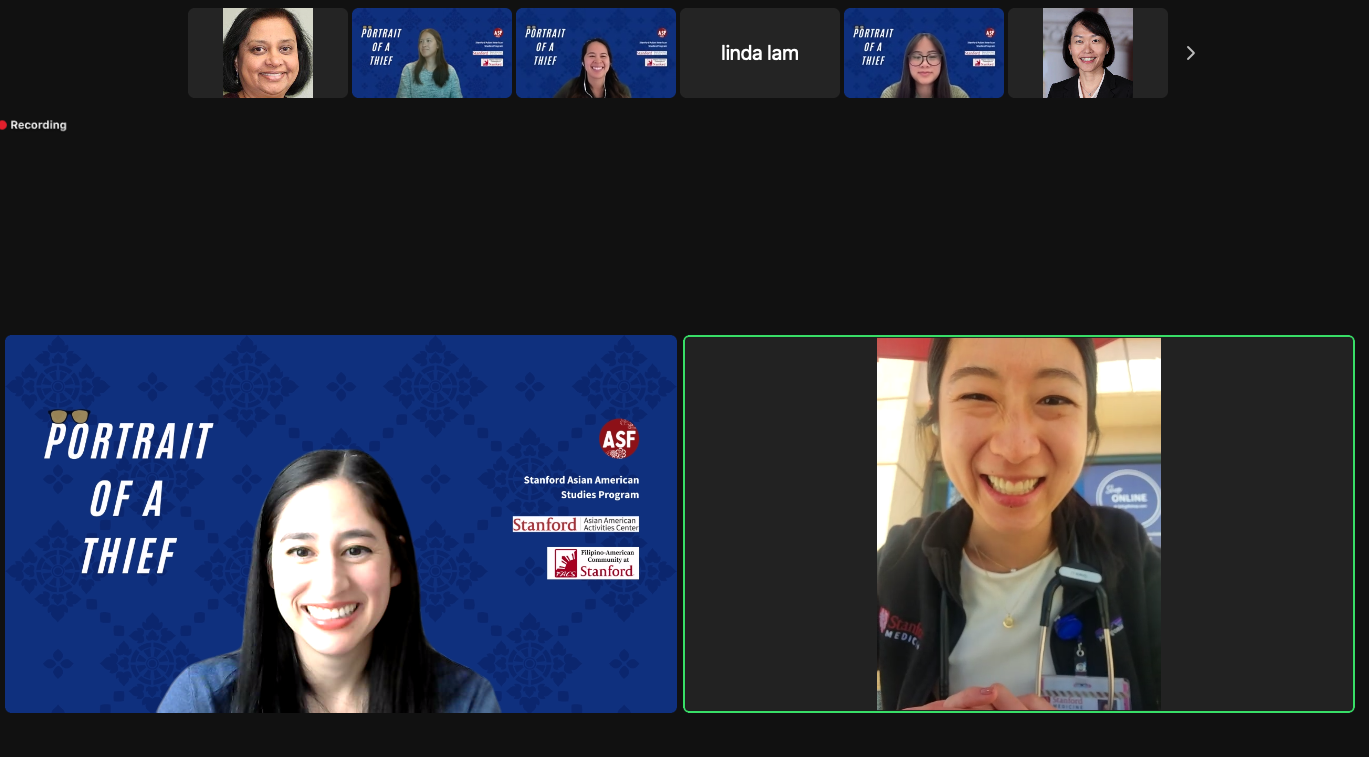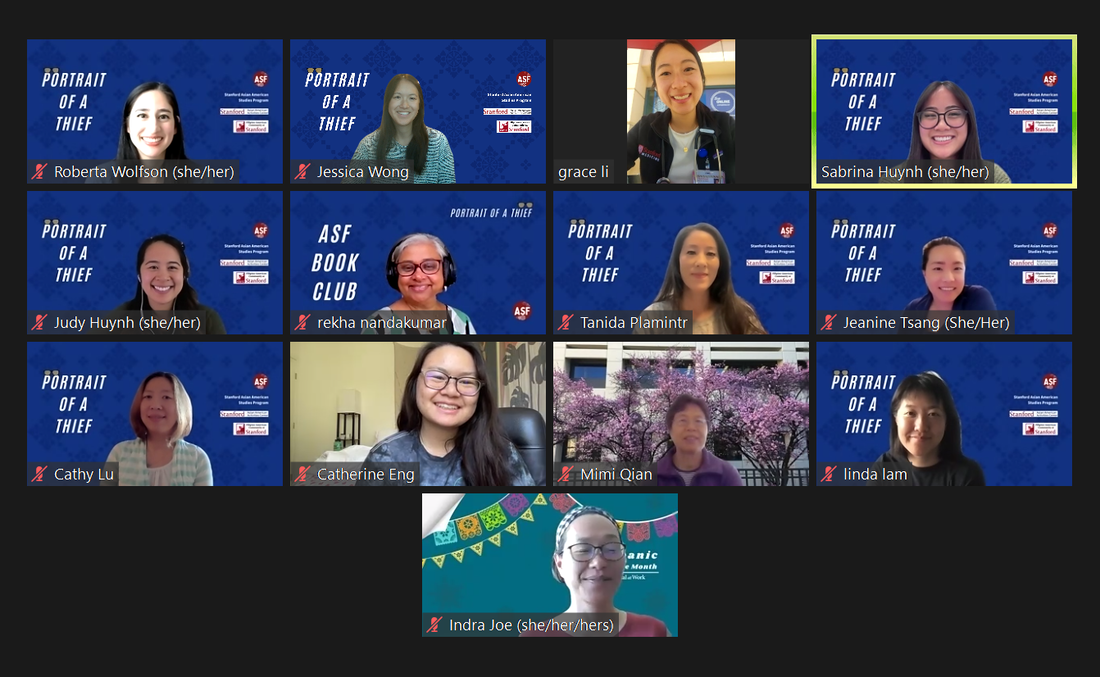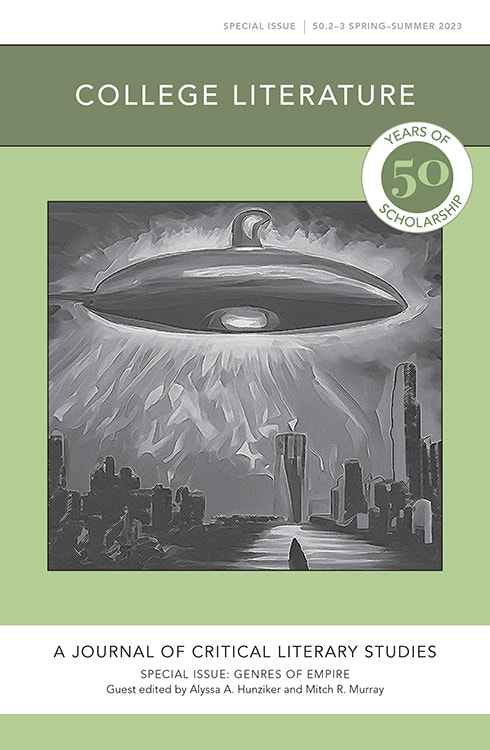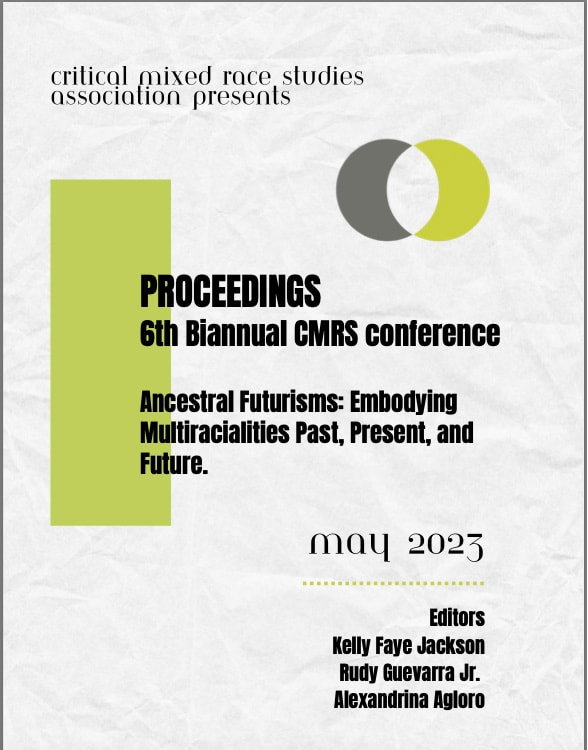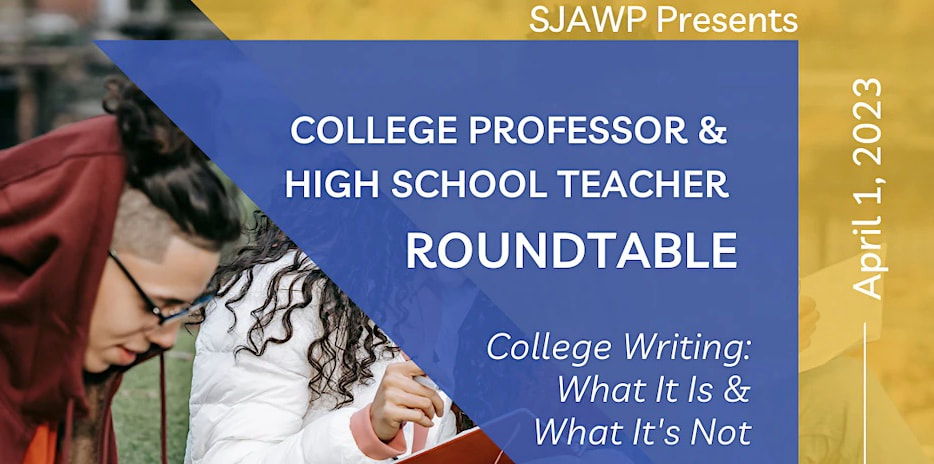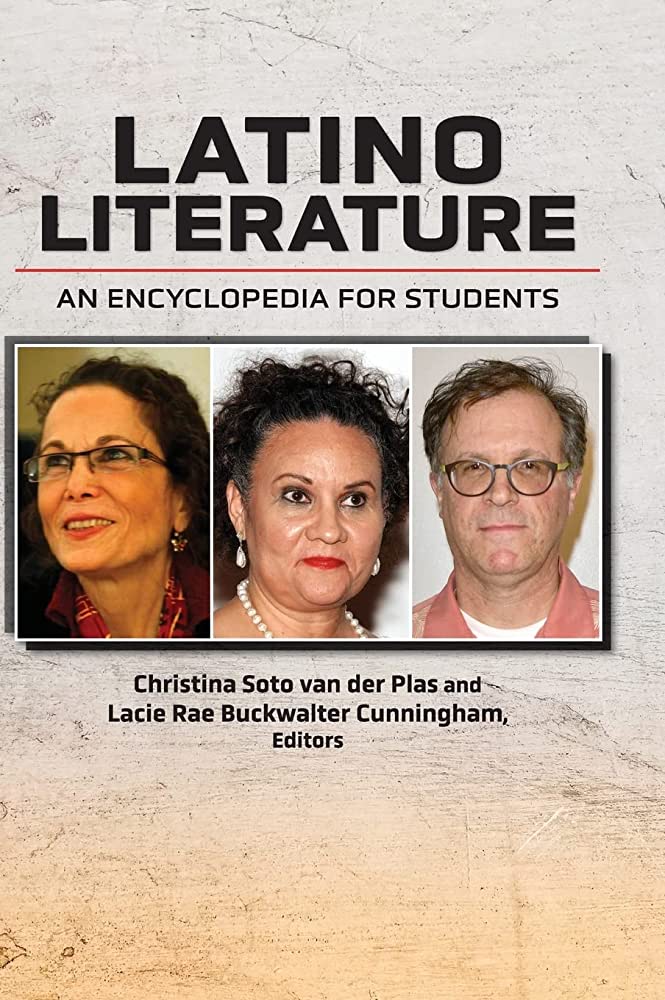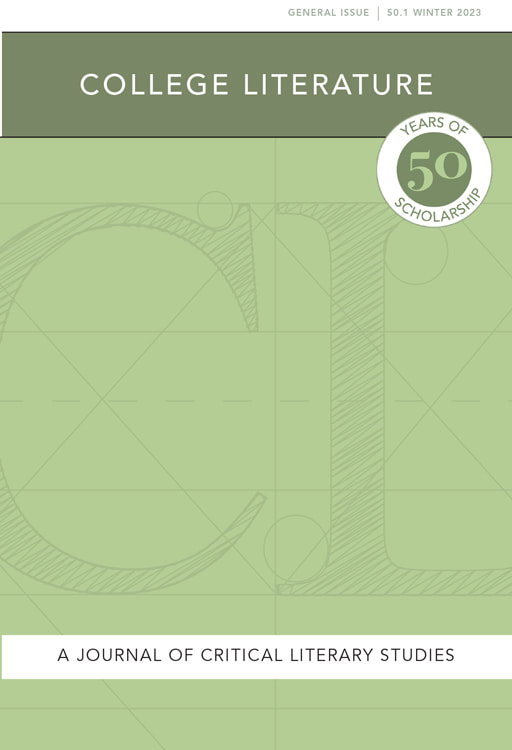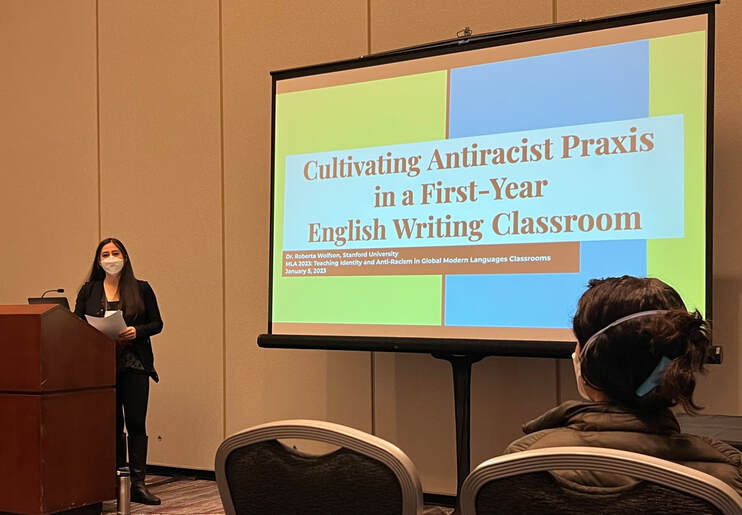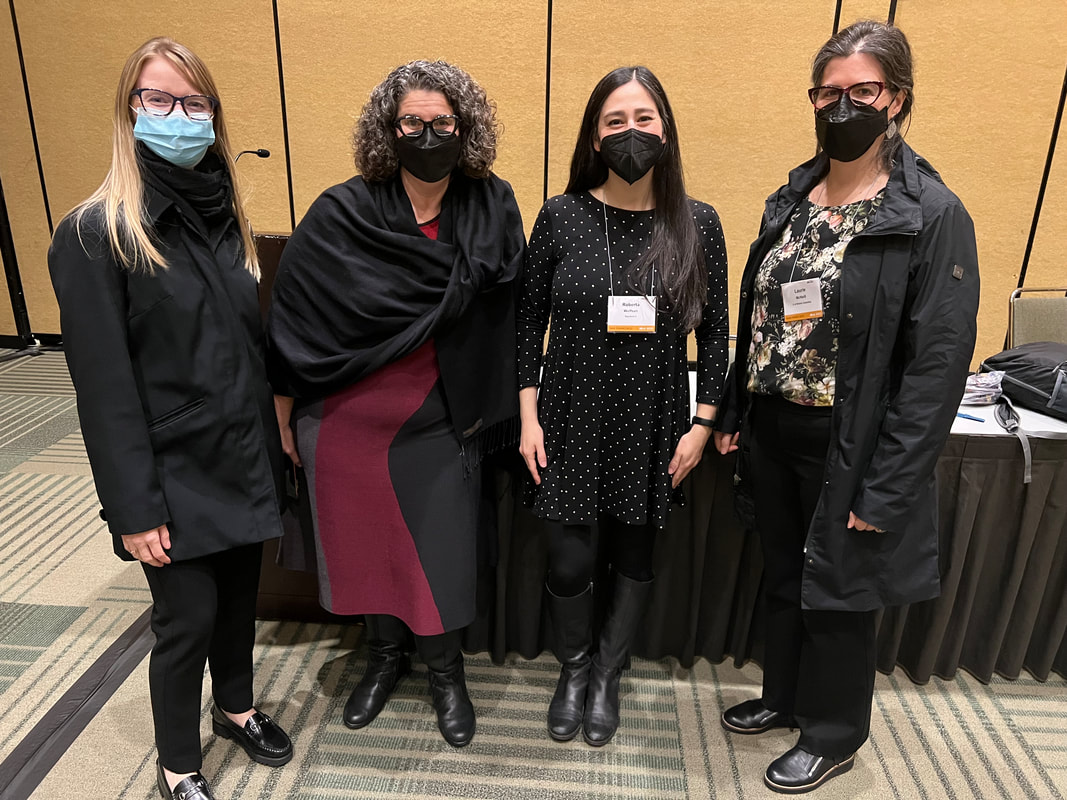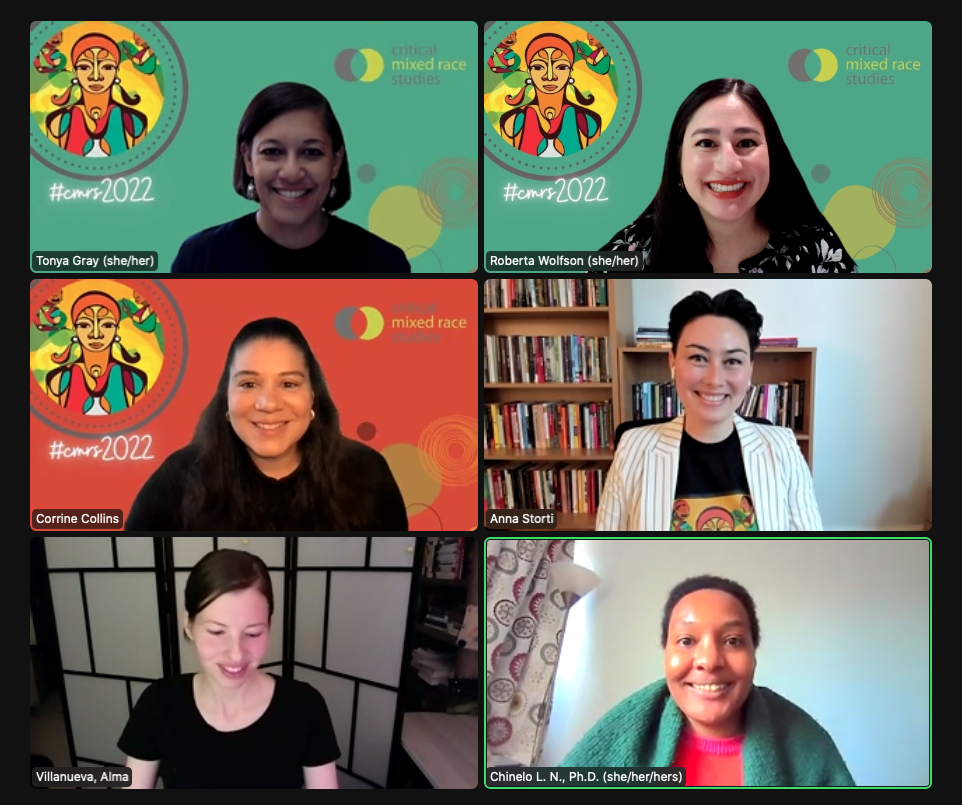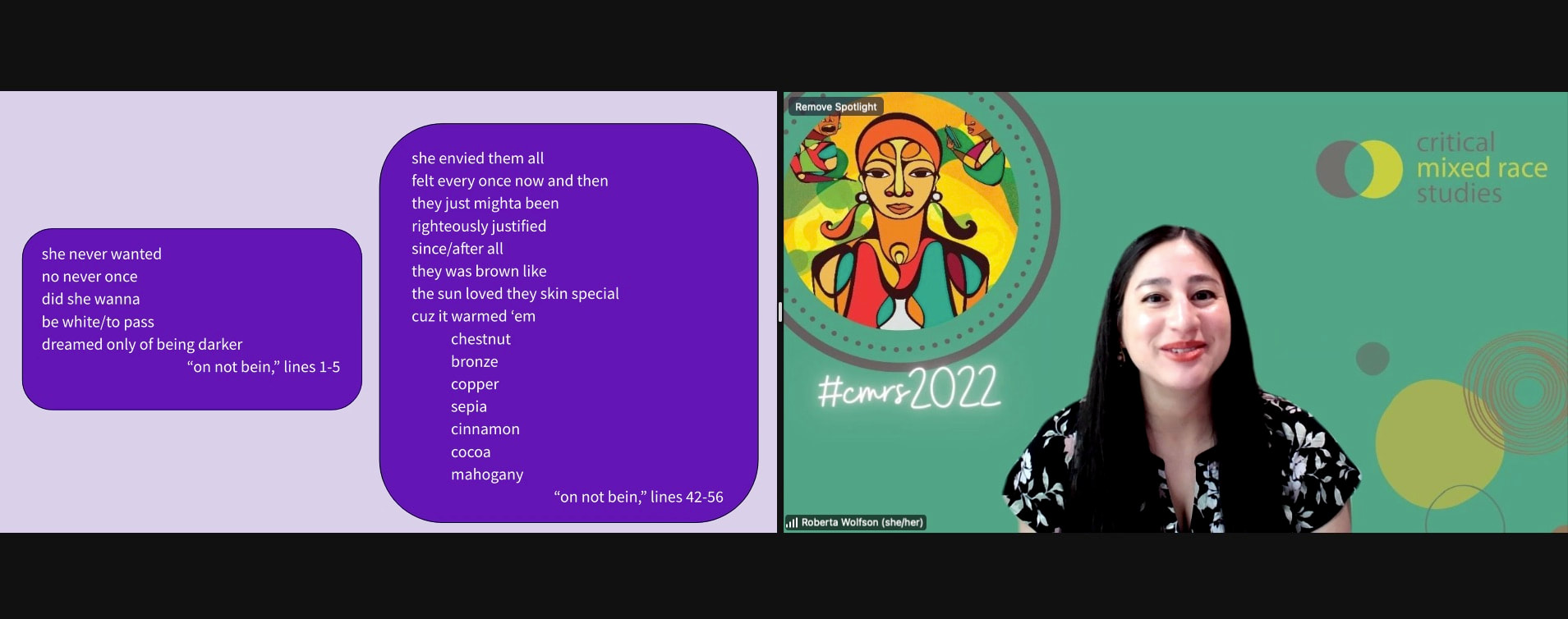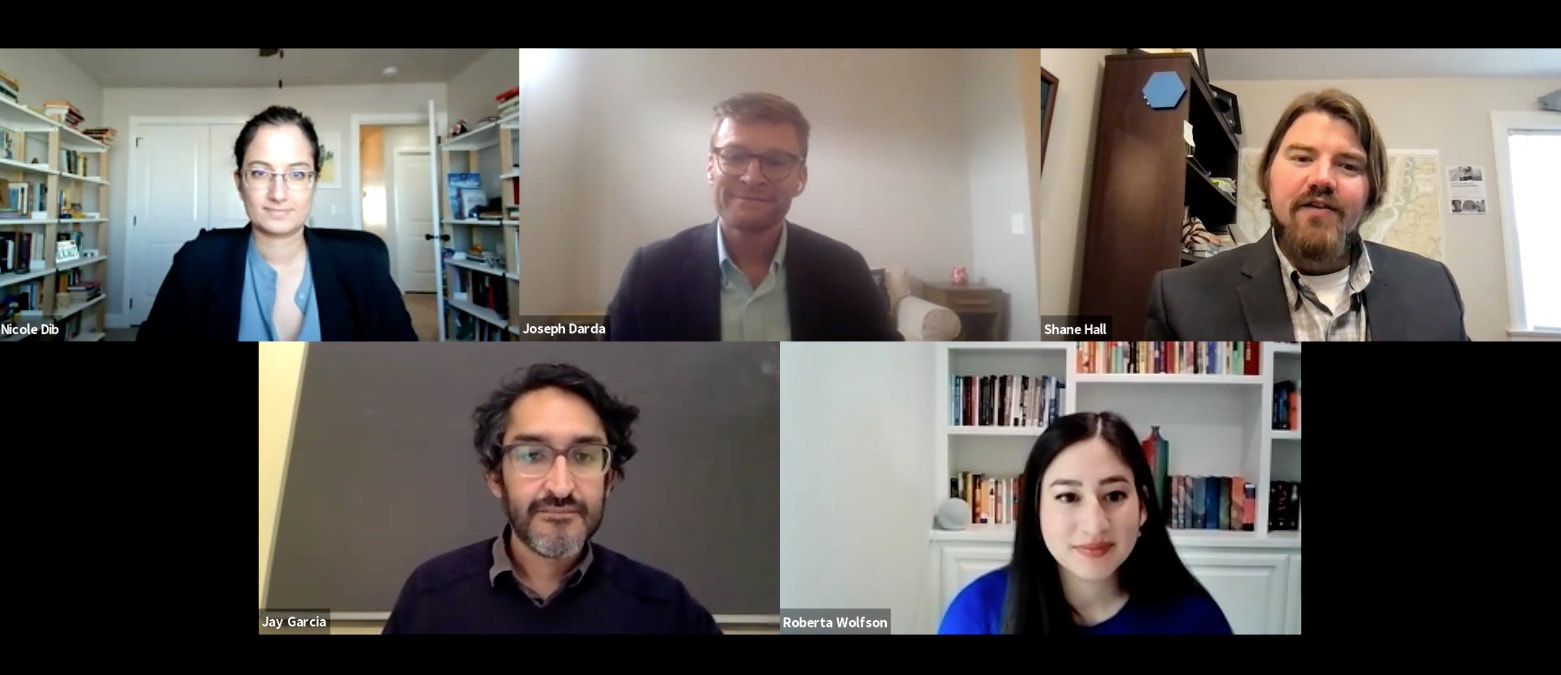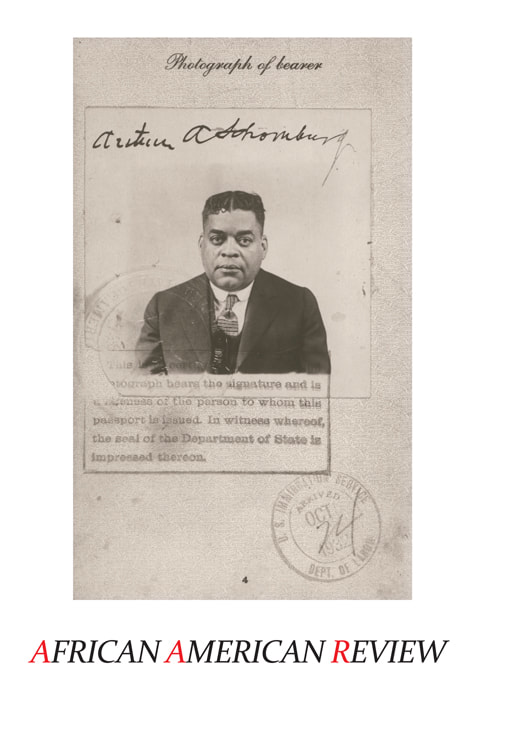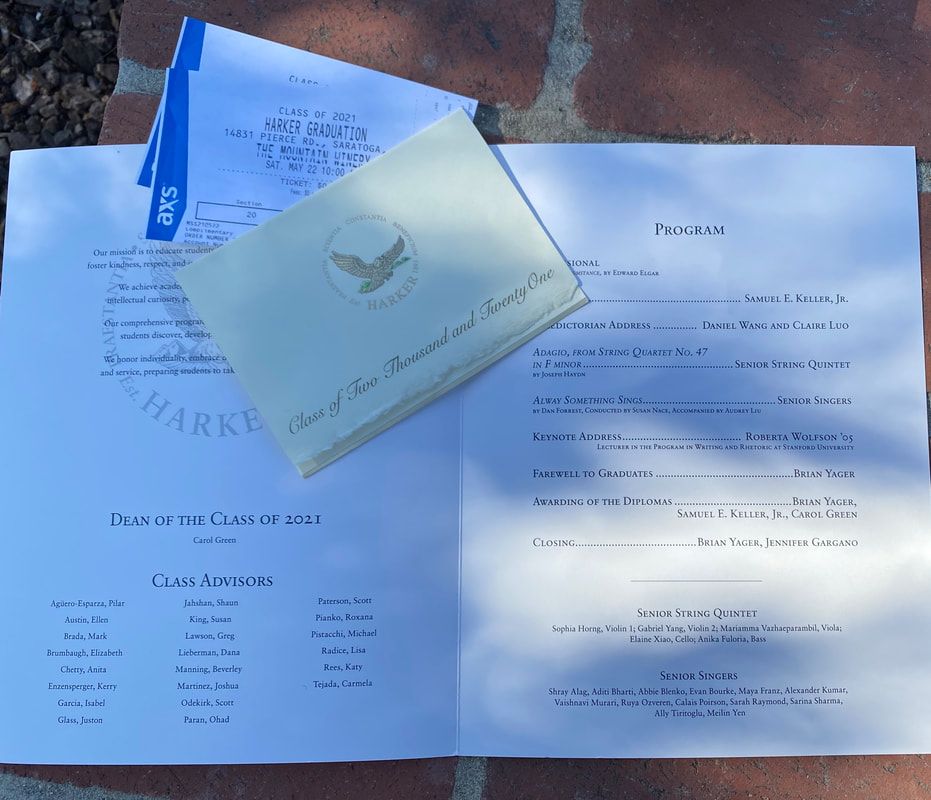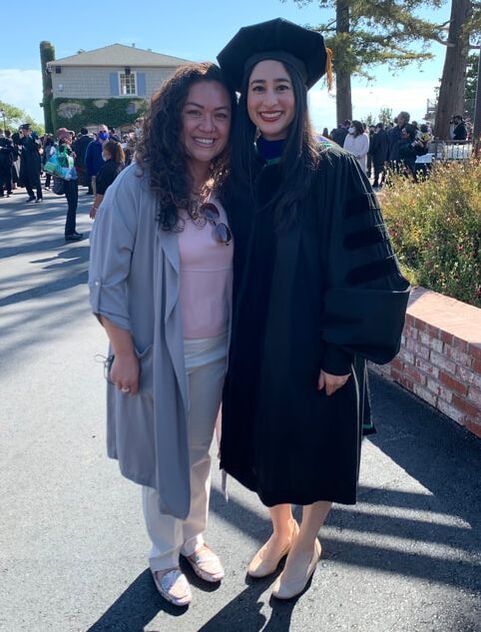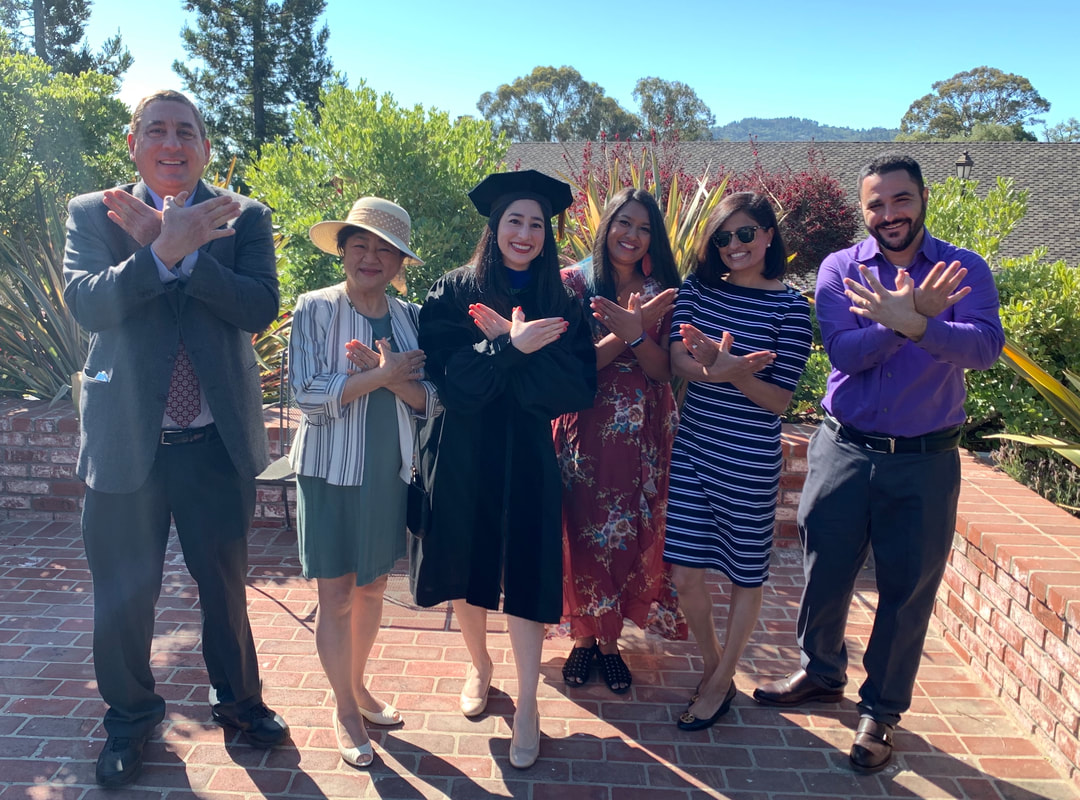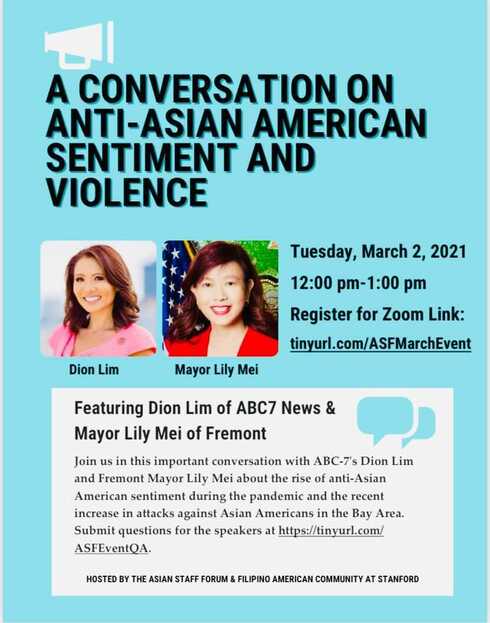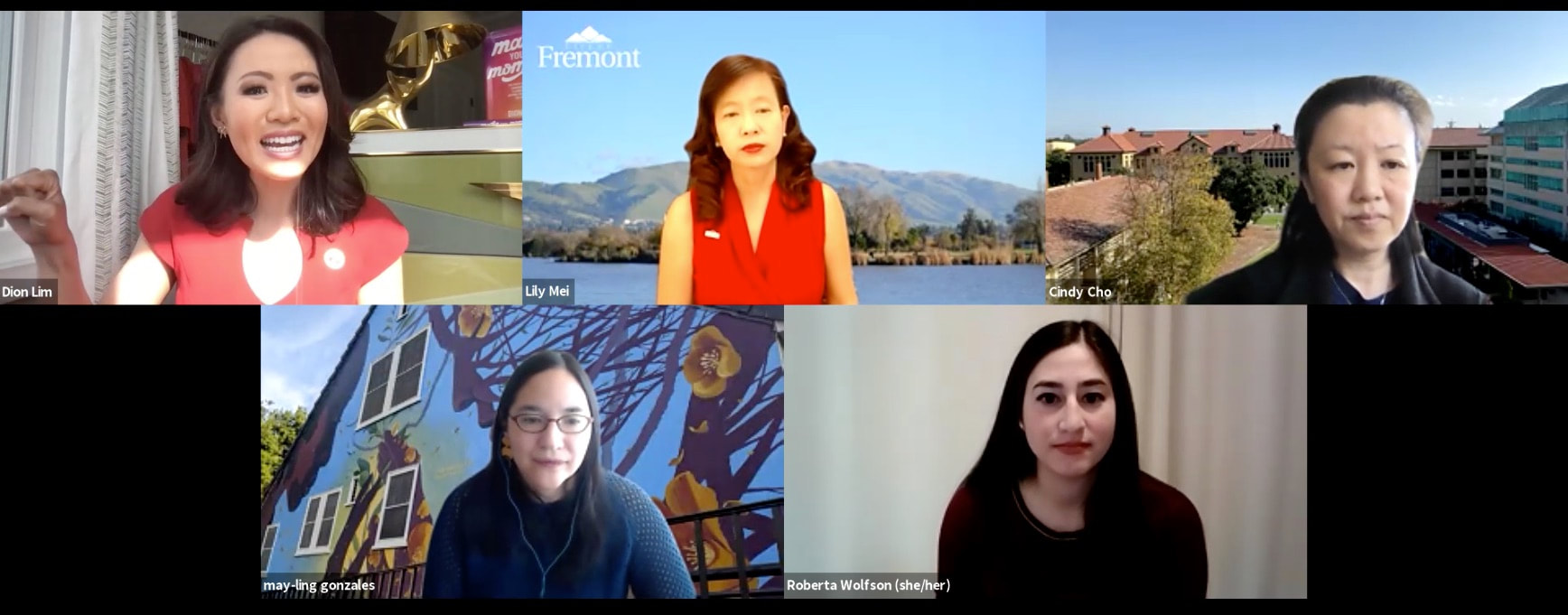|
The day has finally come! I am thrilled to announce that my book Refiguring Race and Risk: Counternarratives of Care in the US Security State was officially published today by The Ohio State University Press. Words cannot fully express how humbled, excited, and thrilled I feel to know that my manuscript, a culmination of over a decade of researching, writing, and revising, is finally out in the world.
This day would not have been possible without the support of so many people, including my inspiring colleagues, my dear family, and my cherished friends. From the bottom of my heart, thank you for your endless love and encouragement. Please click here to learn more about my book and order a copy. From now until July 2025, you can get a 30% discount and free shipping with the code WOLFSON.
0 Comments
I am thrilled to share that the Program in Writing and Rhetoric at Stanford published a feature article on me in its most recent newsletter that came out earlier this month. In preparation for this article, my colleague Kevin C. Moore interviewed me to learn about my pedagogy and research, particularly the development of my forthcoming book Refiguring Race and Risk: Counternarratives of Care in the U.S. Security State (coming out in July 2024 by The Ohio State University Press). I am delighted by how much care Kevin put into describing my book's arguments and journey from first conception to final publication. In the article, Kevin conscientiously outlines my writing process and narrates how my scholarly research informs my teaching. Above all, I'm grateful to be surrounded by such a generous community of colleagues here at PWR and feel very supported in my identity as a teacher, scholar, and writer. Click here to check out the article in full.
Last week, on June 13-15, 2024, I attended the 2024 conference meeting of the Critical Mixed Race Studies Association, a scholarly and activist community that meets biennially to critically explore racial formations through a multiracial lens. The theme for the conference meeting was "More than Betwixt and Between: Solidarity and Liberation in Beloved Communities." The conference convened both in person at The Ohio State University and virtually, allowing hundreds of community organizers, artists, scholars, and activists to come together from all over the world. I presented twice during the conference. On Friday June 14th, I joined a roundtable conversation on "The Multiracial Pasts and Futures of Asian American Speculative Fiction," with Cynthia Zhang (University of Southern California), Dr. Melissa Erika Poulsen (Menlo College), and Dr. Nancy Carranza (Riverside City College). During this roundtable discussion, I analyzed the vignette "Machine Love" from Greg Pak's film Robot Stories (2003), which I taught during my fall 2023 Stanford course on ethnofuturist rhetorics. "Machine Love" tells the story of an android robot (a "Sprout G9 iPerson") that is subjected to dehumanization while performing menial computing work in a corporate office setting. Envisioning a future in which humans and AI robots are inextricably intertwined (a vision that is not too far from our current reality), "Machine Love" raises questions about the ethics of developing humanoid intelligence only to sell it on the mass market purely for human exploitation. We might ask ourselves: What happens if we allow this technology to develop without critically interrogating our current society’s racial, gendered logics? The answer to this question, I suggest, lies in thinking about the racialization of the Sprout G9 iPersons as mixed race Asians, which I argue is not incidental, but rather reflective of two longstanding problematic tropes in the US popular imaginary: first, the belief that Asians are inherently "other," and second, the myth that mixed race people represent the promise of a postracial future. My fellow panelists offered exciting readings of other works of Asian American speculative fiction that feature multiracial characters or perspectives, such as Lois Ann Yamanaka's Behold the Many, Violet Kupersmith's Build Your House Around My Body, Marjorie Liu's Monstress, and Ling Ma's Severance. On Saturday, June 15th, I presented on a second panel called "What is the 'Critical' in Critical Mixed Race Studies?: Theorizing Mixedness through Structural, Geo/political, and Contextual Analytics of Power" alongside Alma Villanueva (Independent Scholar), Dr. Anna Storti (Duke University), and Jasmine Kelekay (UC Berkeley). In my talk, "'I'm Not the Person You Think I Am': Familial Loss and Multiracial Identity Erasure in Danzy Senna's New People," I explored how the experience of racial imposter syndrome can be heightened when racially ambiguous multiracial individuals lose a family member who represents a critical connection to their minoritized ancestry. By way of answering this question, I analyzed Danzy Senna's most recent novel New People (2017), which narrates the emotional breakdown of a white-presenting twenty-seven-year-old woman of remote Black ancestry named Maria after she suffers the death of her adopted mother Gloria, a monoracial Black woman. I greatly appreciated having a supportive scholarly forum to articulate this argument, which is rooted in my own personal inquiries as a mixed race person who has suffered the loss of beloved grandparents in recent years. Overall, it was a rewarding and fulfilling experience to participate in this conference for the second time (see my previous post about attending the 2022 CMRSA conference). I can't wait to bring what I learned into future versions of my Stanford PWR 2 course on mixed race identity, as well as into my future research projects.
I am thrilled to announce that my book manuscript, Refiguring Race and Risk: Counternarratives of Care in the Security State, is scheduled to be published by The Ohio State University Press in July 2024 as part of the Fall 2024 catalog. After working on this manuscript for over a decade, I am humbled and awed to be able to begin the countdown to seeing it in print.
Here is the description of my book from the publisher: "In Refiguring Race and Risk, Roberta Wolfson turns to novels, memoirs, and other cultural works to debunk the false sense of national security rooted in positioning people of color as embodiments of risk. Considering output by Miné Okubo, Sanyika Shakur, Abraham Verghese, Khaled Hosseini, Helena María Viramontes, and others, Wolfson demonstrates how these authors disrupt racist security regimes and model alternative strategies for managing risk by crafting stories of collective care and community building. Chapters discuss, among other examples, how gang members defy the mass incarceration of Black and Latinx Americans by committing to self-education and self-advocacy; how an Asian immigrant doctor offers a corrective to the pandemic-era trend of allowing xenophobia to inform public health decisions by providing human-centered medical services to HIV-positive patients; and how Latinx migrant farmworkers battle ongoing precarity amid the increasing militarization of the US-Mexico border by bartering life-sustaining resources. In revealing how these works cultivate love as a mode of political resistance, Wolfson relabels people of color not as a source of risk but as critical actors in the push to improve national security." If you had the power to imagine the future of race, what would it look like? This is the central question that I sought to explore with students enrolled in my new advanced course this fall quarter, "Ethnofuturist Rhetorics: Imagining the Future of Race." Having just wrapped up the course, I wanted to take some time to reflect on the experience. Cross-listed in both the Program in Writing and Rhetoric and the Center for Comparative Studies in Race and Ethnicity at Stanford, this course offered an in-depth study of ethnofuturism, a rhetorical movement to envision the future of race relations. I was inspired to teach this course because I have long been an admirer of speculative/science fiction, which has a unique ability to get me to reflect on present-day issues in ways that other genres cannot. Darko Suvin famously explained this phenomenon when he theorized in Metamorphoses of Science Fiction (1979) that science fiction produces “cognitive estrangement,” thus allowing us to notice the constructedness of our current reality and interrogate the status quo. I wanted to design a class where I could explore this phenomenon with my students. As a teacher and researcher who specializes in antiracist rhetoric and critical race studies, I sought to actively disrupt the traditional canon of science fiction, which tends to be written by, for, and about white/cis/hetero men. Too often, canonical science fiction erases people of color from the future or problematically whitens them to feed a post-racial fantasy. And there is a long history in the United States of using speculation about the future as a rhetorical tool to reinforce capitalist, white supremacist, fascist ideologies. In designing this course, I sought to decenter whiteness in speculative fiction and present ethnofuturist speculative rhetorics as an important corrective to the white popular imaginary’s insistence on characterizing people of color as frozen in time, technologically stunted, or pushed to the margins. We started the course by examining examples of speculative ethnofuturist rhetoric (such as films, stories, comics, visual artwork, music albums, and visual reality projects) produced by Black, Asian, Latinx, and Native writers and artists, assessing how they envision the future consequences of existing racial systems and imagine alternative possibilities for societal race relations. I carefully designed my syllabus to showcase a variety of genres produced by authors of different racial identities, so that students could see how ethnofuturism serves as a powerful liberatory rhetorical framework for all communities impacted by white supremacy, as well as take inspiration from different genres when designing their own ethnofuturist texts later in the term. Despite their many differences, these texts all share a commitment to envisioning what it could mean for people of color not just to survive but also to thrive in the future. In the second part of the course, students followed in the footsteps of these ethnofuturist rhetors by selecting a racial justice issue that they wanted to learn more about and creating their own work of ethnofuturism designed to consider the future of this issue. Many chose to work in more conventional narrative forms by writing short stories and poetry collections. Others took on more unconventional forms, including a play, a virtual reality project, and a work of interactive fiction. I am so impressed with how these projects are able to do so much at once, including address a contemporary racial justice issue, effectively incorporate an ethnofuturist framework (like dystopia, magical realism, historical revisionism, alternative timelines, etc.), and appropriately engage the rhetorical conventions required of their chosen genre. In one project, a student sought to address the lack of mental health support for Black people suffering from racial trauma by creating a virtual reality experience that allows users to enter a wellness center where they can undergo healing not only by using contemporary therapeutic methods, but also by being transported into the past (where they can experience a personal history free of racial injury) and the future (where they can imagine what their future might look like without racial injury). Other final projects were similarly moving and compelling, with some offering dystopian visions (such as by imagining how technological advancements will only exacerbate the violent militarization of the U.S.-Mexico border) and others imagining utopias based on racial liberation (such as a future in which the prison industrial complex has been eradicated). It was especially exciting to be joined by two guest speakers this quarter. The first speaker was one of the authors represented on the course syllabus, Walidah Imarisha, an Afrofuturist writer/researcher and Assistant Professor in Black Studies at Oregon State University. She joined us via Zoom to talk about her research and writings, and the students greatly appreciated having the opportunity to ask her questions about her short story “Black Angel,” her craft, and the anthology of social justice-oriented speculative fiction called Octavia's Brood: Science Fiction Stories from Social Justice Movements that she co-edited with adrienne maree brown. She also offered some valuable advice to my students, who were embarking on creating their own ethnofuturist texts. For example, she reminded them that ethnofuturist writing (what she has termed "visionary fiction") is "fundamentally hopeful." In addition, she encouraged them to keep a central question in mind as they designed their visions: "How can we have the kind of society where everyone's needs are met?" The second speaker was Rev. Dr. Sakena De Young-Scaggs, the Senior Associate Dean for Religious and Spiritual Life and Pastor of Memorial Church here at Stanford, who completed her Ph.D. research on how Afrofuturism can be used as a framework for creating liminal spaces of Black joy. She joined us in person to present on her important research and lead the students in a lively conversation. It was inspiring to hear her speak about how the speculative Black arts can serve as a liberatory platform for "renewal and resistance" and support communal gatherings (such as comic book conventions and science fiction reading circles) to circulate "milieus of personal hope with a vision for a better future." It was a true honor to be able to teach this class to such a dedicated group of Stanford students. I am grateful to the Program in Writing and Rhetoric for making this teaching opportunity possible and for spotlighting the class in the program's latest newsletter. I hope I am able to offer this course many more times in the future!
This past Tuesday, October 10th, I had the great pleasure of facilitating a conversation with best-selling author Grace Li in an event hosted by the Asian Staff Forum (ASF) at Stanford. This conversation was the culminating event of ASF's 2023 book club, in which we read Li's debut novel Portrait of a Thief. (For a brief history of how I helped launch the ASF book club in 2021 as a member of the ASF board, check out this previous blog post.) After enjoying several engaging conversations with other ASF members about the book throughout May to September 2023, it was a real treat to get a chance to talk with the author herself about the book's themes and messaging. During our conversation, Li offered many compelling insights about the origins of the novel, the development of her characters, and her writing process. Describing this novel as an "identity story disguised as a heist story," she shared that writing this book was very healing for her, as it allowed her to reflect on her own search for belonging as a Chinese American. Rather than worry about the audience for this book or limit her imagination based on white-centric norms in U.S. literary culture, she developed a cast of five Chinese American protagonists inspired by her own personal history, experiences, and interactions. In addition to recently launching her literary career, Li is currently studying full-time as a Stanford medical student. In fact, she joined our virtual conversation in between rounds during one of her hospital rotations. Given her impressive ability to balance so many different commitments, it was particularly valuable to hear her insights about how to navigate a busy routine while also maintaining a consistent writing practice. She gave us some helpful writing productivity tips: to protect your writing time, to establish a daily word count goal, and to "focus on what is important, not what is urgent." Above all, she recommended "tapping into joy" throughout the writing process. Clearly, Li's strategies are working for her, as she is currently working with a production team to turn Portrait of a Thief into a Netflix adaptation, and her next book, Anatomy of a Betrayal, is already slated to be published in June 2024. To watch a full recording of the conversation and read ASF's recap of the event, click here.
Last week my latest scholarly essay was published in College Literature: A Journal of Critical Literary Studies as part of a special double issue, "Genres of Empire" (Vol. 50, No. 2-3), which was guest edited by Alyssa Hunziker and Mitch Murray. The collection of essays in this special issue consider how the emerging canon of genre fiction engages with and problematizes contemporary matters of empire (such as colonization, settler colonialism, and neo-imperialism).
My essay, "(Mis)Reading in the Age of Terror: Promoting Racial Literacy through Counter-Colonial Narrative Resistance in the Post-9/11 Muslim Novel," examines two representative works of the post-9/11 Muslim novel, Laila Halaby's Once in a Promised Land (2007) and Mohsin Hamid's The Reluctant Fundamentalist (2007). I argue that these novels rewrite the history of the 9/11 tragedy from a position of counter-colonial resistance in order to denounce the post-9/11 US counterterror state's misinformed and damaging attempts to read the racialized Muslim body. To learn more, you can access the full special issue here, as well as my specific essay here. In a previous blog post, I wrote about my experience presenting at the 6th biennial meeting of the Critical Mixed Race Studies (CMRS) Association, which was held virtually from February 24-26, 2022. Over 400 scholars, artists, and activists convened under the conference theme "Ancestral Futurisms: Embodying Multiracialities Past, Present, and Future." I am pleased to share that my research essay, "Rewriting the Mixed Self: Narrative Resistance against the White Monoracial Imagination," was recently published in the conference proceedings for this meeting. To read my essay along with many other compelling articles about mixed race identity and experiences, you can download the 2022 conference proceedings from the CMRS Association website.
On Saturday April 1st, I had the great pleasure of participating in a roundtable discussion on "College Writing: What It Is and What It's Not" hosted by the San Jose Area Writing Project as part of their Super Saturdays series of pedagogy-building workshops for high school teachers. The goal of this event was to bring high school teachers and college instructors together to dispel myths about college writing and break down what actual college writing looks like (i.e. what skills are emphasized, what types of writing are expected, what work is actually assigned). I co-facilitated this discussion with Hillary Walker, an adjunct professor of African American Studies and Ethnic Studies at the College of Alameda and the Director of the Bay Area Writing Project at the Berkeley School of Education. We opened the conversation by first providing an overview of how we design and teach our college writing classes. I greatly enjoyed hearing how our teaching priorities converge (for example, we both center critical race studies in our classrooms and design curricula that prioritize student agency and individual progress). It was also useful and informative to learn how our pedagogy differs given our different institutional contexts and resources. We then opened up the conversation to the high school teachers in attendance, offering the following questions to guide us:
In the rich conversation that ensued, participants discussed these questions and raised additional questions relevant to their specific concerns. At one point, the conversation focused on whether teaching the novel in the English high school classroom is still a relevant practice, or whether it has become outdated given that many college writing programs de-prioritize literary analysis. At another point, the discussion centered on exploring the role of scaffolding activities in helping students grow as writers over time. A major highlight of the conversation was when we began discussing the important question of how we writing instructors can stop perpetuating white language supremacy, such as by implementing innovative curricular design and alternative evaluation methods. Everyone in attendance expressed a commitment to meeting this objective by honoring their students' diverse home languages and unique forms of expression. However, several participants also acknowledged that they face several constraints in achieving this goal. For example, they might be compelled by district-wide requirements to assign texts from the Western literary canon when designing their curricula. Or they might feel pressured to teach writing skills that are rewarded on college-entrance and college-readiness standardized tests (like the SAT and AP Literature exam). Or they might have limited time as instructors to evaluate forms of writing that deviate from non-traditional Western forms. It was highly encouraging to brainstorm strategies for overcoming these challenges so as to affirm the various language uses and habits of our diverse student bodies.
Overall, I am grateful to have had the opportunity to be in community with fellow writing educators and learn about the rewards and challenges that come with working in educational settings that differ from my own. It was inspiring to know that despite our differences, we all share a passion for helping students develop their unique voices. I'm thrilled to announce that today is the official publication date for Latino Literature: An Encyclopedia for Students (edited by Christina Soto van der Plas and Lacie Rae Buckwalter Cunningham, published by ABC-Clio), a new resource that provides an essential overview of the major literary works produced by Latinx authors alongside related thematic concepts. I contributed an entry to this encyclopedia in which I discuss the life and works of Los Angeles-based Chicano author/activist Luis Javier Rodriguez, whose memoir Always Running: La Vida Loca, Gang Days in L.A. (1993) was the focus of my first essay of literary criticism. If you would like to read more about how Rodriguez uses his writings (which include memoirs, poetry collections, and short stories) to reduce gang violence, build Chicanx community and identity, and support at-risk youth, click here to download the full copy of my entry.
I am thrilled to announce that my latest article has been published in the winter 2023 edition of College Literature: A Journal of Critical Literary Studies. I first presented the initial ideas for this essay at the 2018 American Literature Association Convention during a panel sponsored by the Circle of Asian American Literary Studies on "Refugee Counternarratives." It is particularly gratifying for me to see this article in print after spending many years developing and fine-tuning its central argument.
Titled "'A Man of Two Faces and Two Minds': Just Memory and Metatextuality in The Sympathizer's Rewriting of the Vietnam War," this essay considers how Viet Thanh Nguyen's Pulitzer Prize-winning debut novel The Sympathizer (2015) represents the history of the Vietnam War from an inclusive lens of remembrance that the author terms "just memory" in his book Nothing Ever Dies: Vietnam and the Memory of War, which was published shortly after The Sympathizer in 2016 and can be read as a scholarly companion to the novel. I argue that The Sympathizer employs several metatextual rhetorical techniques (such as characterizing the narrator as a figure of duality, featuring a nested narrative form, and self-referentially exploring the performativity of writing) in order to denounce the self-serving, one-sided rhetoric of "unjust memory." I show how the novel instead advocates for practicing a more ethical approach to the other that is rooted in recognizing the possibilities and limitations of narrative representation. You can read the abstract and download the full article with institutional access here. This past week, I had the pleasure of attending and presenting at the 138th meeting of the Modern Language Association, which took place from June 5-8, 2023 in San Francisco. This annual gathering brought together thousands of teachers and scholars dedicated to the study of language and literature to share their ideas and research related to the presidential theme "Working Conditions." According to the conference organizers, this theme invited conversation about the following questions:
Throughout the convention, I participated in two sessions focused on exploring the various kinds of labor that I perform as a university writing instructor and literary scholar. First, I presented a talk entitled "Cultivating Antiracist Praxis in a First-Year English Writing Classroom" for a pedagogy-focused panel, "Teaching Identity and Anti-Racism in Global Modern Languages Classrooms." In this talk, I provided an overview of how I teach my first-year course, “Writing for Liberation: The Rhetoric of Antiracism," in the Program in Writing and Rhetoric at Stanford. I sought to answer the question of how instructors of English language and writing might cultivate a commitment to antiracist reading, writing, and research practices in undergraduate students through curricular content. I explained how I have designed my course with two critical goals in mind: first, to show students how white language supremacy dominates rhetorical production in U.S. society and second, to equip them with the critical frameworks necessary to challenge such white language supremacy in their own work as writers and researchers. I encountered an unusual situation when I arrived to deliver this talk. Given the historic Bay Area storms taking place at the time of the conference, none of my fellow panelists were able to attend. This meant that I was the sole presenter in front of an audience of over 30 educators and scholars. Due to this unexpected format change, I ended up delivering a stand-alone talk and leading a dynamic Q&A that lasted over an hour. The audience asked powerful questions about how to dig deeper into the work of building inclusive and antiracist writing pedagogy, and I ended up having one of my most memorable and fun conferencing experiences. Fortunately, my second panel, "(Auto)biographies of/as Work," was attended by all of the expected participants, including a scholar who was videoconferencing in from Turkey. Organized by the MLA Life Writing division and presided over by Laurie McNeill (University of British Columbia), this panel sought to consider how forms of autobiography capture, create, and/or critique experiences and conditions of work and labor, as well as how authors view the work of memoir. I delivered a talk titled "Testifying, Witnessing, and Mourning: Care-Based Labor in the AIDS Memoir," which presented research from a chapter of my current book manuscript. In this talk, I read Dr. Abraham Verghese's memoir My Own Country: A Doctor’s Story (1994) as a critical work of care-based literary labor that chronicles his work as an infectious disease specialist in the U.S. South during the 1980s AIDS crisis and seeks to challenge damaging fear-based approaches to managing this epidemic by modeling a contrasting approach rooted in empathy. I was joined by Rüstem Ertug Altinay (Kadir Has University), who presented on queer autobiographical Turkish literature, Deborah Cohler (San Francisco State University), who presented on memoirs written by military spouses, and Kimberly Hall (Wofford College), who presented on memoirs authored by women employees of Silicon Valley tech companies. Taken together, our talks painted a fascinating picture of the powerful work that autobiography can do to build community, expose damaging cultural practices, reclaim identity and agency, and deconstruct notions of what counts as "labor." In addition to delivering these presentations, I enjoyed attending many other riveting panels, reconnecting with former colleagues from UC Santa Barbara and Cal Poly, SLO, and visiting with my book editor. After kicking off the new year in such an invigorating way, I am excited to bring back what I learned into my research and teaching this winter quarter.
I am delighted to share that my latest article has been published in the The Encyclopedia of Contemporary American Fiction, 1980-2020, which was recently published by Wiley-Blackwell. In this article, I provide an overview of the works of Celeste Ng, the author of bestselling novels Everything I Never Told You (2015) and Little Fires Everywhere (2017). I illustrate how throughout her literary career, Ng has sought to understand the motivations behind human behavior and how such behaviors are informed by intersecting systems of oppression like racism, sexism, and classism. You can read the abstract and download the full article with institutional access here.
This past week, I had the great pleasure of attending the latest meeting of the Critical Mixed Race Studies (CMRS) Association, which took place from February 24th to 26th. This conference revolved around the theme "Ancestral Futurisms: Embodying Multiracialities Past, Present, and Future." Over 400 scholars, educators, activists, and artists who think, teach, and organize around multiraciality gathered together virtually from all around the world to reflect on the question of time in relation to mixed race studies, challenge past conceptions of multiraciality dictated by white supremacy, and imagine new forms of multiraciality rooted in decolonization and radical hope. Panels and workshops covered a range of exciting topics, such as the importance of connecting multiracial identity with ancestral knowledge, how to effectively support mixed race students at both the K-12 and university levels, challenges and rewards related to parenting multiracial children, and representations of multiraciality in popular media like speculative fiction, superhero comics, and television and theatrical productions. Educator, singer, and "RAPtivist" (rap activist) Aisha Fukushima delivered the keynote presentation, which powerfully integrated music, speech, and storytelling. The conference theme was beautifully captured by the design pictured below, "Transition," which was created by Favianna Rodriguez, an interdisciplinary artist, cultural strategist, and social justice activist based in Oakland, CA. To see more of her art, please visit www.favianna.com. On the second day of the conference, I presented on a panel titled "Toward a More 'Critical' Mixed Race Studies: Troubling Representations of Race and Gender" alongside fellow scholars Dr. Anna Storti (Duke University), Ph.D. candidate Alma Villanueva (Texas A&M University) and Dr. Corinne Collins (University of Southern California). Attracting over 80 attendees, our panel examined popular representations of multiraciality in media, narrative, and visual culture in the late twentieth and early twenty-first centuries, with the goal of problematizing how progress narratives are often attached to mixed race bodies. My presentation, "Rewriting the Mixed Self: Narrative Resistance against the White Monoracial Imagination," was inspired by ongoing conversations that I have been having with my students in a new course on multiracial rhetorics that I am teaching this quarter at Stanford, "Not Part but Whole: Writing Mixed Race Identity." In this talk, I considered the tensions between popular discourses about multiraciality and narrative testimonials by mixed race authors. I demonstrated how works by Sui Sin Far, Gloria Anzaldúa, and Mary Hope Whitehead Lee challenge popular conceptions of mixed race people as figures of shame, tragedy, exoticism, and post-raciality. Ultimately, I concluded that these authors engage personal narrative as a life-sustaining platform for reimagining the mixed self beyond the limitations of the white monoracial imagination.
Over the past few months, I have had the great pleasure of helping launch and facilitate an inaugural book club hosted by the Asian Staff Forum (ASF), an organization for which I have been serving as a board volunteer since I began working at Stanford in September 2020. The goal of the book club is to create a space for members of our community to come together and discuss great works that are written by Asian American authors and/or feature themes related to Asian American histories, identities, and experiences. We designed the book club to feature two books a year, with meetings to discuss the first book taking place throughout the fall and winter quarters and meetings to discuss the second book spanning the spring and summer quarters. We debuted our book club by reading and discussing award-winning author Chang-Rae Lee's most recent novel My Year Abroad (2021). From October 2021 to January 2022, we held three meetings to discuss the novel, which attracted a variety of interested parties, including Stanford faculty, staff, and community members. Discussions were consistently lively, with topics ranging from character development to the Cultural Revolution in China to representations of race and gender. Our book club concluded with a capstone event that took place on January 31, 2022, a conversation about the novel with the author himself, which was facilitated by Dr. Rona Hu, a clinical professor of psychiatry at Stanford Hospital and active ASF member. Before the conversation began, I was asked to provide a brief synopsis of the novel for attendees. During the discussion, Lee shared many insights about the creation of the novel, such as how he came up with the ideas for his principle characters, why he chose to interject tragic moments with humor, and what motivated him to give the protagonist partial rather than full Asian ancestry. I was particularly struck by his comment at one point that first-person narration is "the language of the soul" and thus does not have to reflect the actual way that a character might speak in real conversations. Overall, the illuminating conversation served as the perfect ending to a highly successful first book club series. The next book that the ASF book club will read is Chanel Miller's memoir Know My Name (2019), and meetings will take place throughout the 2022 spring and summer quarters. 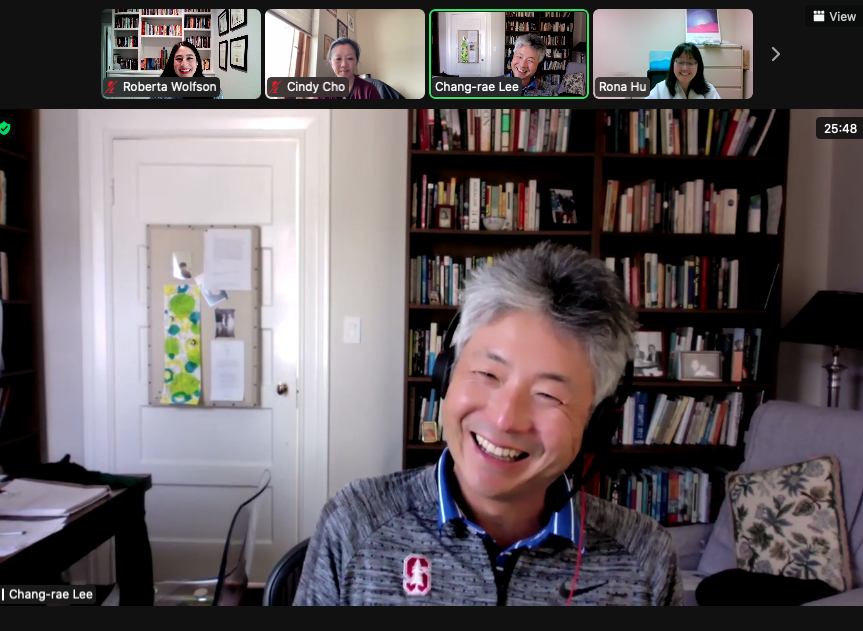 A screenshot from the ASF book club's virtual conversation with Chang-Rae Lee. A screenshot from the ASF book club's virtual conversation with Chang-Rae Lee. This week I attended the 2021 American Studies Association Convention, which was held virtually from October 11-14, 2021. Organized around the presidential theme "Creativity within Revolt," this annual meeting sought to explore the following questions named in the convention program:
I contributed to these discussions by presenting my own research on a panel called "The Containment and Revolt of Antiracist Literature" on October 13th. This panel sought to examine how and why literature has been conceptualized as a vehicle through which to challenge white supremacy, as well as how authors and readers both creatively use narrative to advance antiracist goals and revolt against the constraints of feel-good liberal antiracism. My fellow panelists (pictured above in our virtual conference room) included Nicole Dib, an assistant professor of English at Southern Utah University, who demonstrated how John Okada's 1957 novel No-No Boy employs the trope of automobility to critique Japanese incarceration during World War II; Joseph Darda, an assistant professor of English and comparative race and ethnic studies at Texas Christian University, who explored the development throughout the 1940s of so-called "race novels," such as Richard Wright's Native Son, Lillian Smith's Strange Fruit, and Willard Motley's Knock on Any Door; and Shane Hall, an assistant professor of environmental studies at Salisbury University, who demonstrated how Omar El Akkad's 2017 climate fiction novel American War reinforces racist ideologies under the guise of resource security. Our session chair was Jay Garcia, an associate professor of comparative literature at New York University, who responded to our papers with stimulating questions and commentary. My presentation, titled "(Anti)Racist Reading Practices and the U.S. War on Terror in Mohsin Hamid's The Reluctant Fundamentalist," explored how Hamid's novel rewrites the history of the 9/11 tragedy from a position of counter-colonial resistance in order to denounce the post-9/11 U.S. counterterror state's misinformed, damaging, and racist attempts to read the racialized Muslim body. I argued that by exposing the challenges of reading and interpreting (racial) others in the post-9/11 U.S. counterterror state, The Reluctant Fundamentalist subverts the racist reading practices of the post-9/11 U.S. security state and destabilizes the binary frameworks of good/bad, us/them, Christian/Muslim that fuel the one-dimensional Islamophobic rhetoric used to justify the neo-imperial abuses of the U.S. War on Terror. If you'd like to learn more about my remarks, you can check out a full recording of my presentation below. Recently I was invited by the journal African American Review to provide a review of Candice Jenkins' book Black Bourgeois: Class & Sex in the Flesh (University of Minnesota Press, 2019). The latest edition of African American Review (Spring/Summer 2021) features my review, in which I discuss how Black Bourgeois examines a phenomenon that Jenkins calls "the black and bourgeois dilemma" (6), a conundrum that defines the lived experiences of the middle-class Black subject who enjoys the protection of material wealth while simultaneously enduring the precarity of blackness. To learn more about my thoughts on Jenkins' book, you can access my full review here.
This past Saturday May 22, 2021, I had the great honor of speaking to the Harker graduating class of 2021 at their commencement ceremony, which took place at the Mountain Winery in Saratoga, California. The last time I had been to the Mountain Winery was sixteen years ago, when I enjoyed my own commencement as a member of the Harker graduating class of 2005. I was thrilled to return for such an exciting purpose. Throughout the day, I was flooded by so many memories of my own high school experience, which marked a joyful time in my life, filled with discovery, growth, and friendship.
The day was absolutely beautiful. The sun was shining, and a feeling of accomplishment and celebration filled the air. The graduates and their parents were beaming. It felt extra special to be gathered together for this momentous occasion, especially after so many high school traditions had been canceled or altered due to the pandemic.
My speech was one of several planned for the day. For the first time in Harker history, there were two valedictorians, who both gave moving speeches. Remarks were also given by Jennifer Gargano (the Assistant Head of the Upper School), Brian Yager (the Head of the Upper School), and Samuel "Butch" Keller (the Upper School Division Head). Two senior student groups, a string quartet and a chorus, performed beautiful musical numbers, and each graduate had the opportunity to walk across the stage to receive a diploma to the sound of cheers and applause.
During my speech, I encouraged the graduating seniors to embrace the unknown and think creatively and courageously when striving to achieve their dreams. I also reminded them that as they go out to explore the world, they should never forget that they are part of the generation that came of age in a global pandemic, and that they have already proven their strength, adaptability, and resilience.
Check out the video below to watch the full recording of the ceremony. My speech takes place from 1:03-1:19. I am delighted to share an exciting announcement: I have been invited to give the 2021 commencement speech for my high school alma mater, The Harker School. I have many fond memories of my time at Harker, which I attended from 2001 to 2005. During these four years, I developed lasting life-long friendships, cultivated my intellectual curiosity, and was actively involved in extracurricular activities like soccer, softball, dance, theater, newspaper, and the Junior Classical League (also known as the Latin club). Last week I returned to campus to film a video introducing me to the graduating class of 2021. During my visit, I had a lot of fun seeing how the campus has changed over the years and reminiscing about my high school memories with the alumni director Kristina Alaniz. Check out the video below!
This past Tuesday, March 2nd, I had the great pleasure of speaking at a virtual event, “A Conversation on Anti-Asian American Sentiment and Violence,” which was sponsored by the Filipino American Community at Stanford and Stanford’s Asian Staff Forum (on whose board I serve as a volunteer). This conversation featured two standout guest speakers, San Francisco’s ABC7 News anchor Dion Lim and Fremont Mayor Lily Mei, who discussed the rise of anti-Asian American sentiment during the COVID-19 pandemic, particularly in the Bay Area. Over 400 participants tuned in to be a part of this conversation, showing that many members of the Stanford community and beyond view anti-Asian racism as a critical issue that needs to be addressed.
To provide some historical framing, I opened the discussion by giving a brief overview of the history of anti-Asian racism and violence in the United States. During my presentation, I discussed the origins of the coolie labor trade, the ideology of yellow peril, the myth of Asian Americans as the model minority, and the history of Asian American activism. Check out my full remarks below.
After I provided this overview, Dion Lim and Lily Mei began discussing how the long history of anti-Asian racism continues to influence the contemporary moment. We can see this legacy most notably in the upsurge of coronavirus-related hate that began with anti-Asian rhetoric in the early days of the pandemic and has escalated in recent months into tangible acts of violence, such as Asian Americans being physically assaulted and held at gunpoint. In one tragic incident, 84-year-old Thai American Vicha Ratanapakdee died after sustaining injuries from an attack.
During their conversation, Dion Lim and Lily Mei covered a variety of topics, such as what constitutes a hate crime and how the city of Fremont and ABC7 News have mobilized efforts to raise awareness about anti-Asian violence. They also offered some excellent suggestions for what community members can do to resist this upsurge in anti-Asian American sentiment, including using their voices and platforms to speak out against hate, providing opportunities for the next generation of Asian Americans to break into leadership roles, and engaging in interracial and cross-cultural efforts to combat racism.
To learn more about this event, check out The Stanford Daily’s coverage or visit the Asian Staff Forum’s website, where a recording of this webinar will be viewable for a limited time. You may also be interested in these additional resources:
|
AboutCheck out this page for periodic updates about my research, teaching, and community work. |





